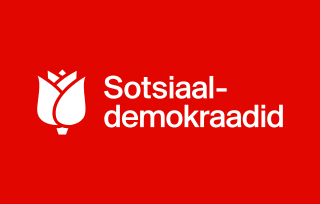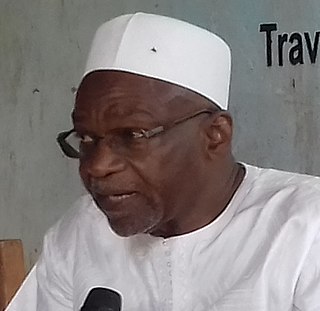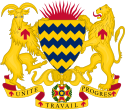
The Patriotic Salvation Movement is the ruling political party in Chad.

The Mongolian People's Party (MPP) is a social democratic political party in Mongolia. It was founded as a communist party in 1920 by Mongolian revolutionaries and is the oldest political party in Mongolia. The party played an important role in the Mongolian Revolution of 1921, which was inspired by the Bolsheviks' October Revolution. Following independence, it governed Mongolia as a one-party socialist state. The party changed its name to the Mongolian People's Revolutionary Party (MPRP) and joined the Communist International in 1924 and served as a sole-ruling party of the Mongolian People's Republic.

The Social Democratic Party is a centre-left political party in Estonia. It is currently led by Lauri Läänemets. The party was formerly known as the Moderate People's Party. The SDE has been a member of the Party of European Socialists since 16 May 2003 and was a member of the Socialist International from November 1990 to 2017. It is orientated towards the principles of social-democracy, and it supports Estonia's membership in the European Union. From April 2023, the party has been a junior coalition partner in the third Kallas government.

Chad holds elections on national level for a head of state – the president – and a legislature. The president is elected for a five-year term by the people. The National Assembly has 155 members, elected for a four-year term in 25 single-member constituencies and 34 multi-member constituencies. Chad is a one party dominant state with the Patriotic Salvation Movement in power, although according to the African Union, elections in Chad are generally free and fair. Human Rights Watch, however, has criticized the election process in Chad, arguing that they have problems such as electoral fraud, multiple voting, underage voting, and low voter turnout.

Elections in the Comoros take place within the framework of a multi-party democracy and a presidential system. The President and the majority of the seats in the Assembly of the Union are directly elected.

Elections in Yemen take place within the framework of a presidential system, with both the President and House of Representatives elected by the public. Due to political instability, elections have not been held regularly since the early 2000s.

Saleh Kebzabo is a Chadian politician. He is the President of the National Union for Democracy and Renewal (UNDR) and a Deputy in the National Assembly of Chad. He was designated Prime Minister by president Mahamat Déby on 12 October 2022.
The Rally for the Republic – Lingui is a political party of Chad. At the 2002 parliamentary election it won 1 out of 155 seats.
Nouradine Delwa Kassiré Koumakoye is a Chadian politician and the head of the National Rally for Development and Progress (VIVA-RNDP) political party. After serving as a minister in the government during the 1980s and early 1990s; he was Prime Minister of Chad from November 6, 1993 to April 8, 1995 and again from February 26, 2007 to April 16, 2008. In 2008, he became President of the Economic, Social and Cultural Council.

The Chadian Progressive Party, known as the National Movement for the Cultural and Social Revolution for the last two years of its existence, was the first African political party in Chad. It was a regional branch of the African Democratic Rally (RDA).
Jean Alingué Bawoyeu, known in French as the vieux sage, which translates as "wise elder", is a Chadian politician who was Prime Minister of Chad from 1991 to 1992. During the 1970s, he served successively as Ambassador to the United States and France. Later, he was President of the National Assembly in 1990. He served in the government as Minister of Justice from 2008 to 2010 and as Minister of Posts and New Information Technologies from 2010 to 2013.
Lol Mahamat Choua was a Chadian politician who served as his country's head of state for four months in 1979. He was the President of the Rally for Democracy and Progress (RDP) political party.

The unicameral National Assembly is Benin's legislative body.

Parliamentary elections were held in Chad on Sunday, 13 February 2011, the first since 2002. The elections were originally scheduled for 28 November 2010, but were postponed following a meeting in September between the ruling party and opposition leaders. According to the National Independent Electoral Commission (CENI), this was due to timing constraints caused by complications encountered during electoral preparations.
General elections were held in Bangladesh on 27 February 1991. The Bangladesh Nationalist Party (BNP) emerged as the largest party in parliament, winning 140 of the 300 directly elected seats. The BNP formed a government with the support of the Islamic party Jamaat-e-Islami, and on 20 March Khaleda Zia was sworn in for her first term as Prime Minister.

The Mongolian Revolution of 1990, known in Mongolia as the 1990 Democratic Revolution, was a peaceful democratic revolution which led to the country's transition to a multi-party system. It was inspired by the economic reforms of the Soviet Union in the late 1980s and was one of the many revolutions of 1989. It was led mostly by young demonstrators who rallied at Sükhbaatar Square, in the capital city Ulaanbaatar. The main organisers of the demonstrations included Sanjaasürengiin Zorig, Erdeniin Bat-Üül, Davaadorjiin Ganbold, Tsakhiagiin Elbegdorj, Bat-Erdeniin Batbayar.

The fall of communism in Albania, the last such event in Europe outside the Soviet Union, started in December 1990 with student demonstrations in the capital, Tirana, although protests started in January that year in other cities like Shkodra and Kavaja. The Central Committee of the communist Party of Labour of Albania allowed political pluralism on 11 December and the largest opposition party, the Democratic Party, was founded the next day. March 1991 elections left the Party of Labour in power, but a general strike and urban opposition led to the formation of a "stability government" that included non-communists. Albania's former communists were routed in elections in March 1992 amid economic collapse and social unrest, with the Democratic Party winning most seats and its party head, Sali Berisha, becoming president.

The Second Hungarian Republic was a parliamentary republic briefly established after the disestablishment of the Kingdom of Hungary on 1 February 1946 and was itself dissolved on 20 August 1949. It was succeeded by the Hungarian People's Republic.

Presidential elections were held in Chad on 25 April 2011, after being postponed from 3 April.

Parliamentary elections were held in Chad on 14 December 1969. The country was a one-party state at the time, with the Chadian Progressive Party as the sole legal party. It therefore won all seats in the National Assembly, which was enlarged from 75 to 101 seats. Voter turnout was 95.11%.











